Index relies entirely on the support of donors and readers to do its work.
Help us keep amplifying censored voices today.
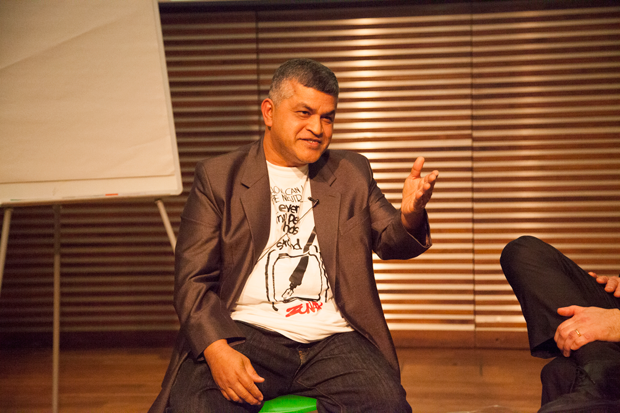
Malaysian cartoonist Zunar is facing charges under a colonial-era sedition act. (Photo: Sean Gallagher/Index on Censorship)
Malaysian police have opened an investigation on the latest book of political cartoons by Zulkiflee SM Anwar Ulhaque, or Zunar.
A sales assistant who manages online sales of the title, Sapuman – Man of Steal, on the website zunar.my has been ordered to attend a meeting with police under the sedition act. The questioning will take place in central Kuala Lumpur on Monday 5 October at noon.
“I strongly condemn these latest police tactics to frighten people from getting access to read and buy my books. My sales assistant did nothing illegal as the Sapuman – Man of Steal is not officially banned by the government. On the contrary, the police should investigate who took RM2.6 billion ($384 million) of public funds instead of clamping down on book sellers who sell books legally,” Zunar said in a statement.
This is the second online sales manager who has been investigated by the police. In November 2014, Zunar’s webmaster was investigated under the sedition act and the penal code. The police also harrassed MOLPay, a cash payment service for e-commerce merchants, to disclose the names of the cartoonist’s online customers, but the company refused to reveal the information. Zunar’s books cannot be sold in stores throughout the country due to pressure from authorities.
Sapuman is Zunar’s 18th book of political cartoons. Previously, seven of his books were banned by the government and confiscated by the police. Other books included Conspiracy to Imprison Anwar, Pirates of Carry-BN and Rose in Kangkong Land.
Zunar is currently facing nine simultaneous charges and 43 years in prison under the country’s controversial sedition act. The case, which was brought against him in April 2015, has now been postponed until 6 November while a legal challenge to the act is reviewed in Malaysia’s courts.
“Zunar and those who work with him are being harassed simply for exercising his right to express himself. We reiterate our call on Malaysia to immediately drop all charges against Zunar, stop targeting his colleagues and respect free expression,” said Index on Censorship CEO Jodie Ginsberg.

Datuk Seri Najib Tun Razak,
The Prime Minister of Malaysia,
Office of The Prime Minister,
Main Block, Perdana Putra Building,
Federal Government Administrative Centre,
62502 Putrajaya, MALAYSIA
19 May 2015
Dear Prime Minister Najib,
We, the undersigned international organisations, urge the Malaysian authorities to drop charges against cartoonist Zulkiflee Anwar Haque “Zunar”, who is currently facing a record-breaking nine charges under the Sedition Act for comments made on the social media network Twitter, for which – if convicted – he could face up to 43 years in prison.
We also call upon the Malaysian authorities to repeal the Sedition Act, a law that is used as a tool to stifle legitimate debate and dissent. In 2012, Prime Minister Najib Razak made a commitment to repeal the Sedition Act. However, following the most recent election, he has instead extended the Sedition Act’s reach and strengthened the penalties for infringement in a move we believe is intended to help maintain his party’s hold on power.
Freedom of expression is an essential part of any democratic society and the Malaysian authorities must protect this right for all, including those who are critical of government. Rather than safeguard this right, the authorities have intensified their crackdown on journalists, writers, activists, students, academics and artists. We, the undersigned international organisations, condemn these violations and urge the international community to support Zunar and everyone in Malaysia to speak freely in accordance with the Universal Declaration of Human Rights.
Sincerely,
ARTICLE 19
English PEN
Index on Censorship
Media Legal Defence Initiative
PEN International
CC:
Tan Sri Abdul Gani Patail, Attorney General
Tan Sri Dato’ Sri Khalid bin Abu Bakar, Inspector General of Police
A Kenyan woman speaking out for women in one of the world’s most dangerous regions and a female journalist who exposed an unreported uprising in Saudi Arabia are among the winners of this year’s Index on Censorship Freedom of Expression Awards.
“Our shortlisted nominees are all tackling direct and serious threats to stifle free speech,” said Index on Censorship CEO Jodie Ginsberg. “We were humbled and inspired by their stories, and their dedication to ensuring we can all speak freely.”
The awards were presented at a ceremony at The Barbican, London, hosted by comedian Shappi Khorsandi whose father Hadi was forced into exile from Iran because of his satirical writing.
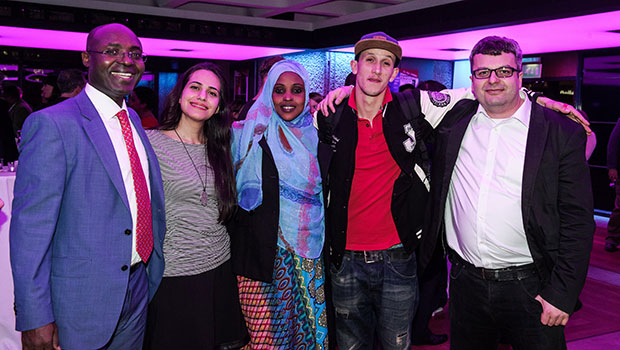
Index on Censorship 2015 Freedom of Expression award winners: Rafael Marques de Morais (journalism), Safa Al Ahmad (journalism), Amran Abdundi (campaigning), Mouad “El Haqed” Belghouat (arts) and Tamas Bodoky (digital activism) (Photo: Alex Brenner for Index on Censorship)
Awards are presented in four categories: journalism, arts, campaigning and digital activism. The winners were Saudi journalist Safa Al Ahmad and Angolan reporter Rafael Marques de Morais (journalism – jointly awarded); Moroccan rapper “El Haqed” (arts); Kenyan women’s rights campaigner Amran Abdundi (campaigning); and Hungarian freedom of information website Atlatszo (digital activism).
The crime of free expression
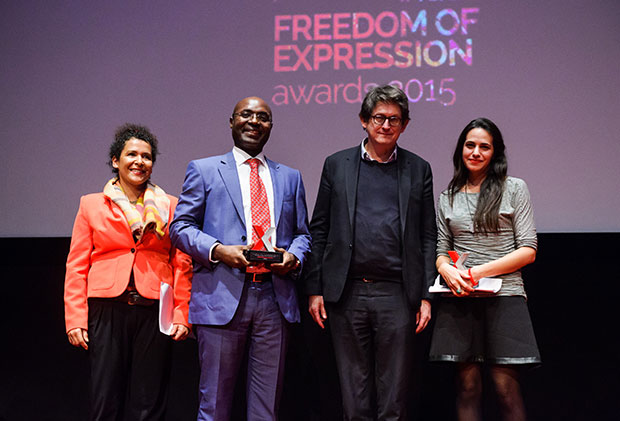
Journalist and campaigner Mariane Pearl, journalism award recipient Rafael Marques de Morais, Guardian editor Alan Rusbridger and journalism award recipient Safa Al Ahmad (Photo: Alex Brenner for Index on Censorship)
Al Ahmad was recognised for her documentary Saudi’s Secret Uprising, which exposed details of an unreported mass demonstration in Saudi Arabia. “Safa Al Ahmad dared to go into places that are difficult for women and for reporters, to bring that information back and share it with the world,” said Turkish author Elif Shafak, one of the five judges. Saudi Arabia is a mystery, even to its own people, said Al Ahmad in her acceptance speech: “Parts of our history is deliberately concealed, the present is muddled with rumours and half-truths. The government-owned and controlled media play a major role in the dissemination of those false realities of ourselves and others. This makes facts a precious commodity in Saudi Arabia.”
Angolan investigative reporter Marques de Morais has been repeatedly prosecuted for his work exposing government and industry corruption and will go on trial on 24 March charged with defamation. “Rafael is a very important individual doing very important work in a very, very difficult environment,” said judge Sir Keir Starmer QC. Marques de Morais dedicated his speech to the Zone 9 group of Ethiopian bloggers currently in jail “for the crime of exercising their right to freedom of expression”.
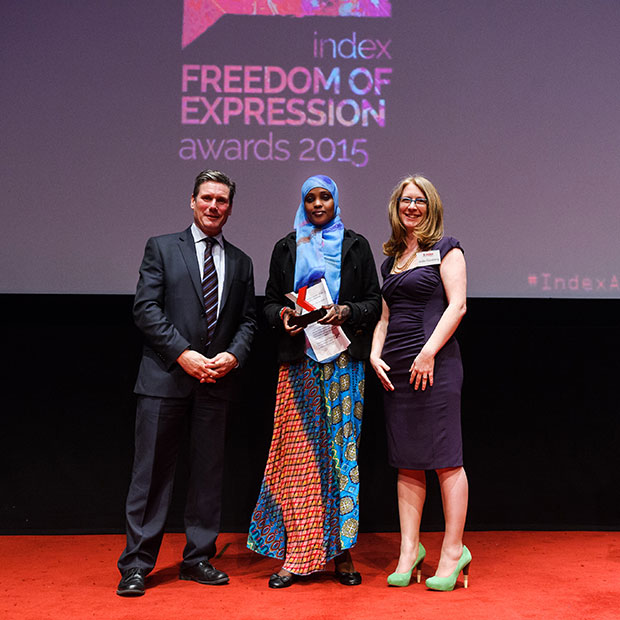
Doughty Street barrister Keir Starmer, campaigning award recipient Amran Abdundi and Index on Censorship CEO Jodie Ginsberg (Photo: Alex Brenner for Index on Censorship)
The winner in the campaigning category, Amran Abdundi, is a women’s rights activist based in north-eastern Kenya and runs a group helping women along the dangerous border with Somalia, where terrorism and extremist violence dominate. Judge Martha Lane Fox said: “Amran Abdundi was a standout candidate for me. She is doing something incredibly powerful in an unbelievably complicated and dangerous situation.” Abdundi dedicated her award to the “marginalised women of northern Kenya… who will now know that their struggles and their efforts to fight for their rights are being recognised internationally”.
Help us let the world know the truth
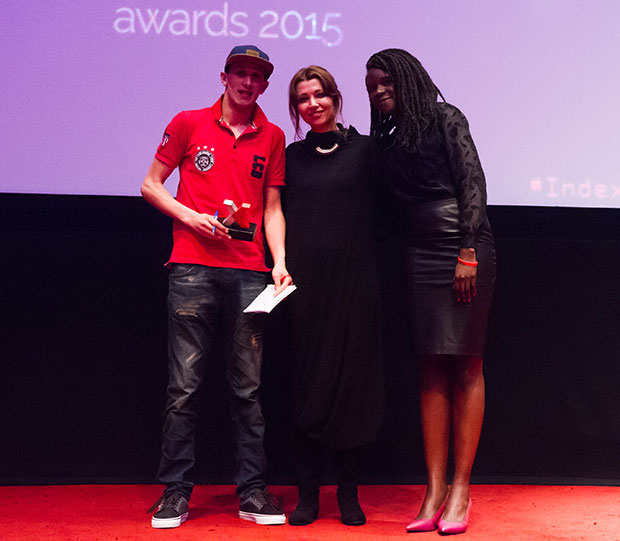
Arts category winner Mouad “El Haqed” Belghouat, novelist Elif Shafak and actor Stella Odunlami (Photo: Alex Brenner for Index on Censorship)
Arts category winner Mouad “El Haqed” Belghouat is a Moroccan rapper and human rights activist whose music highlights widespread poverty and endemic government corruption in Morocco. He has been imprisoned on spurious charges three times in as many years, most recently in 2014. Belghouat said in his acceptance speech: “I have been through difficult times: I was jailed, fired from my work, rejected by many friends. I am still forbidden to sing in my own country. But after all that I am still determined that I will never change my position. I will fight for freedom, equality and human rights for ever.” Lane Fox said Belghouat had taken his music and “translated it into a kind of online activism, but then, crucially, mobilised people in the street”.
The digital award, decided by public vote, went to Hungarian investigative news outlet Atlatszo.hu managed by Tamás Bodoky. The website acts as watchdog to a Hungarian government which has increasingly tightened its grip on press freedom in the country. Editor-in-chief Bodoky said Atlatszo.hu called on all those who believe that independent journalism in Hungary is under threat. “All those who agree that politics and business interests have sunk their claws into everyday life. All those who know that taxpayer money is vanishing. We are calling on you to help us let the world know the truth.”

Entrepreneur Martha Lane Fox, digital activism award recipient Tamas Bodoky and actor Jolyon Rubinstein (Photo: Alex Brenner for Index on Censorship)
The awards were presented by the judges along with special guests including Guardian editor Alan Rusbridger.
A special award was also given on the evening to honour the many Azerbaijani journalists and activists jailed or forced into exile or hiding following a recent crackdown by the government. Former award winner and journalist Idrak Abbasov, who was forced to flee Azerbaijan last year, accepted the award on behalf of all those facing persecution in the country. “I call upon the world community to help Azerbaijan… so that our colleagues might be released and that our country might become a normal state in which we and others might live freely,” Abbasov told the audience in a video speech.
The evening featured an exhibition of specially commissioned cartoons by international cartoonists, reflecting on the past 12 months for free expression. Most of the artists had direct experience of persecution over their work, including Syrian political cartoonist Ali Ferzat – a former Index award winner – and Malaysia’s Zunar. “In the wake of the attacks on Charlie Hebdo, we wanted to pay homage to the work of cartoonists who are so often the first to face censorship in any move to stifle free expression,” said Index’s Jodie Ginsberg.
Related
• Safa Al Ahmad: Facts are a precious commodity in Saudi Arabia
• Rafael Marques de Morais: I believe in the power of solidarity
• Amran Abdundi: This award is for the marginalised women of northern Kenya
• El Haqed: I will fight for freedom, equality and human rights for ever
• Tamas Bodoky: The independence of journalism in Hungary is under threat
• Special Index Freedom of Expression Award given to persecuted Azerbaijani activists and journalists
• Video: Comedian Shappi Khorsandi hosts Index on Censorship awards
• Drawing pressure: Cartoonists react to threats to free speech
An earlier version of this article stated that Rafael Marques de Morais will go on trial on 23 March. The date is 24 March.
This article was posted on 18 March 2015 at indexoncensorship.org
South America |
|
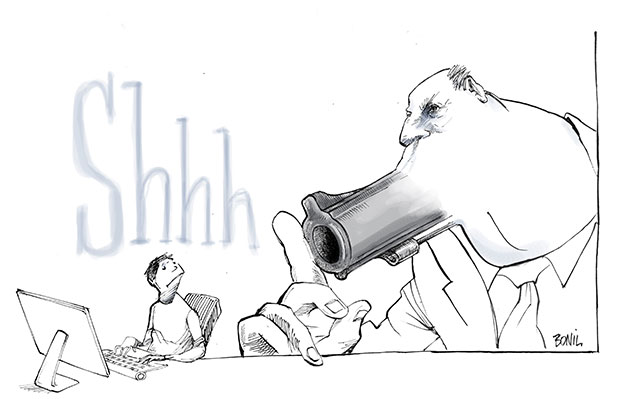
|
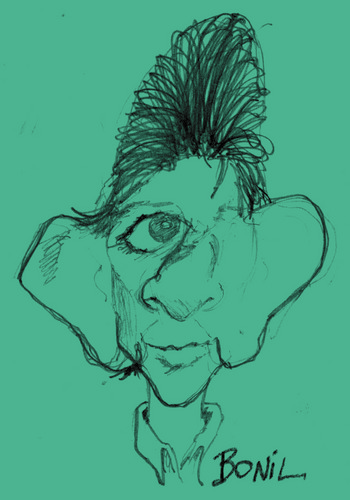
Xavier Bonilla (Bonil)EcuadorBonil has been criticising Ecuador’s political leaders in his cartoons for 30 years. Regularly denounced, threatened and fined, Bonil has earned the title “the pursued cartoonist”. @bonilcaricatura |
|
|
|
North America |
|
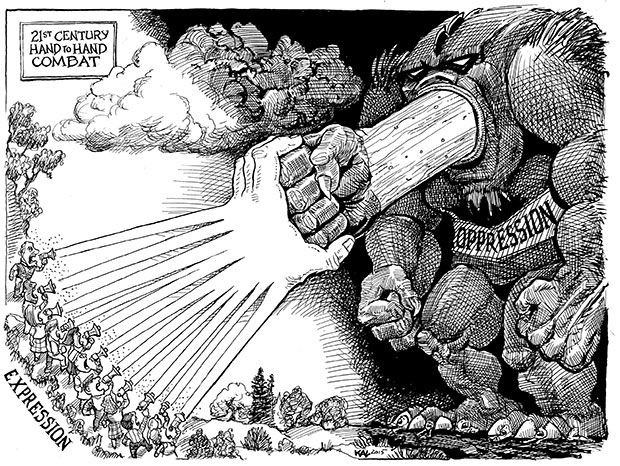
|

Kevin Kallaugher (Kal)United StatesUS artist Kal spent 10 years drawing cartoons in London before returning home, where he continues to work. He has won numerous awards and his cartoons have been featured in more than 100 publications around the globe. @kaltoons | web |
|
|
|
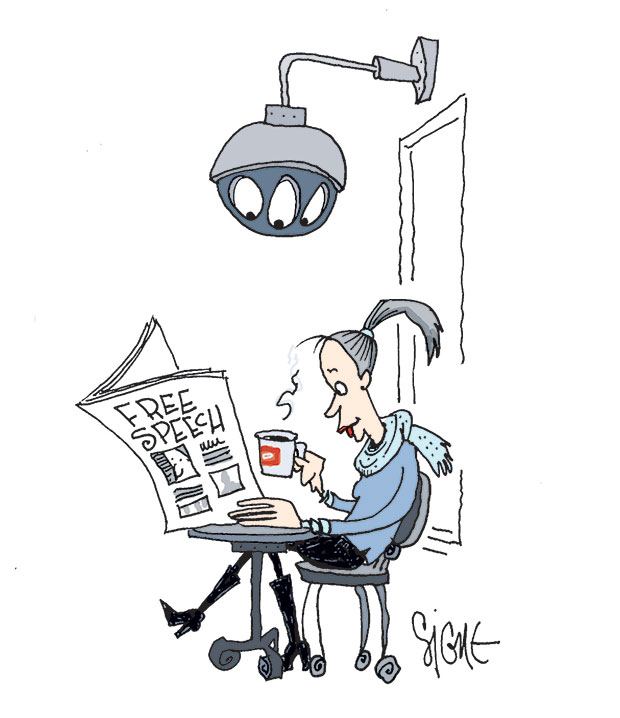
|
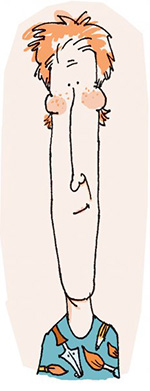
Signe Wilkinson (Signe)United StatesIn 1992, Signe became the first woman to win the Pulitzer Prize for Editorial Cartooning, and she has since won several other awards for her work. She comments on topical political issues and is best known for her daily cartoons in The Philadelphia Daily News. @SigneWilk | Facebook |
|
|
|
Europe |
|
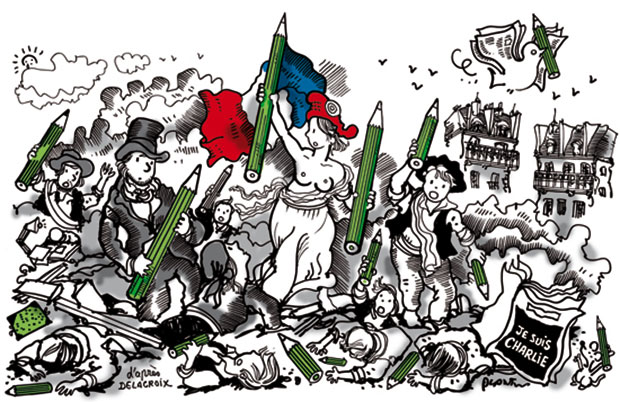
|
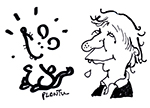
Jean Plantureux (Plantu)FrancePlantu, the chief cartoonist for France’s Le Monde, is co-founder of Cartooning for Peace. Since the Charlie Hebdo attacks, Plantu has had a constant security detail but says he intends to continue to draw. @plantu | web |
|
|
|
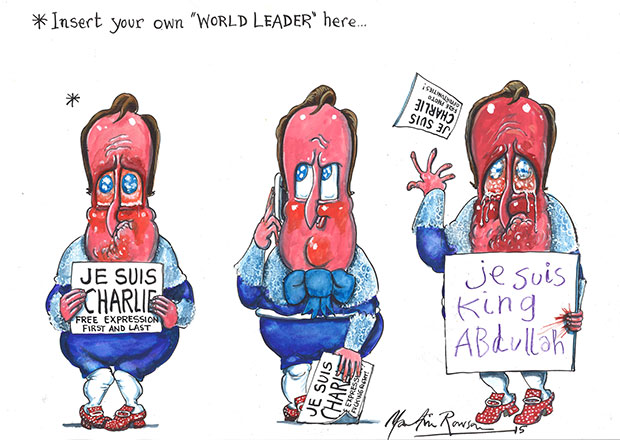
|
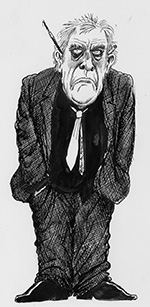
Martin RowsonUnited KingdomPolitical satirist Martin Rowson contributes cartoons to The Guardian and the Daily Mirror as well as Index on Censorship magazine. His work has earned him several awards, as well as an official appointment as Cartoonist Laureate of London in 2001. @MartinRowson |
|
|
|
Middle East |
|
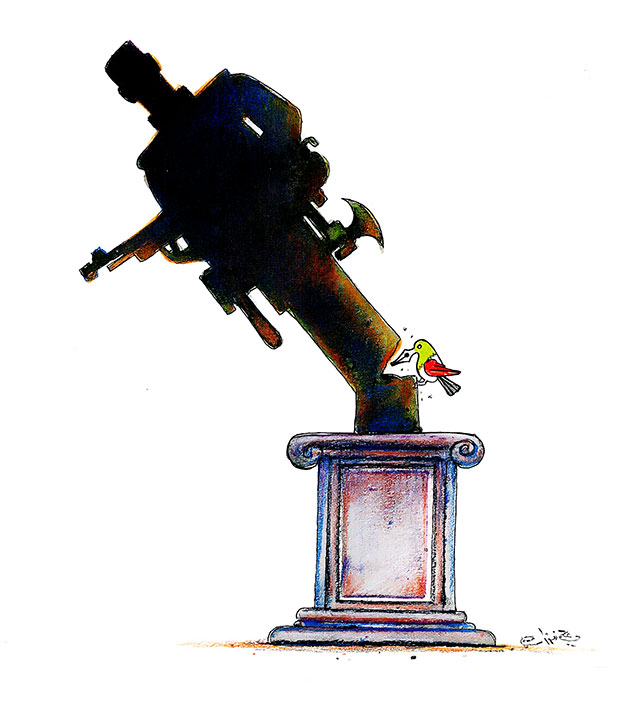
|
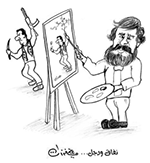
Ali FarzatSyriaFormer Index arts award winner Ali Farzat came to global attention in 2011, when he was pulled from his car and beaten by Syrian security forces who broke both his hands. Farzat recently worked for Kuwaiti Newspaper Al-Watan, which has been closed by authorities after criticising the government. |
|
|
|
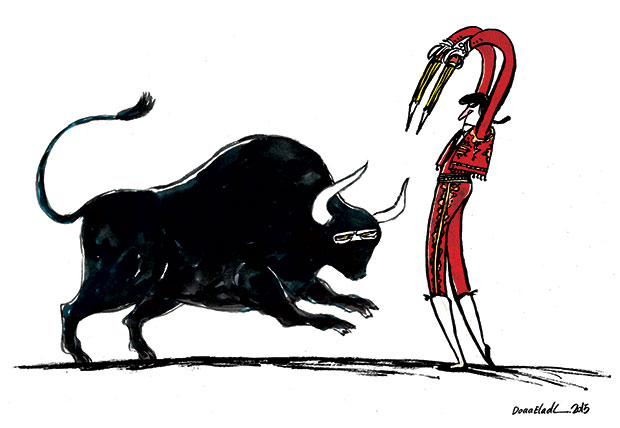
|
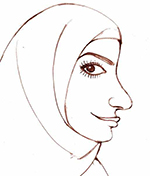
Doaa El AdlEgyptDoaa El Adl has been an award-winning cartoonist for prominent Egyptian newspaper Al Masry Al Youm since 2008. She has faced threats and charges of blasphemy for her illustrations. @doaaeladl |
|
|
|
Asia |
|
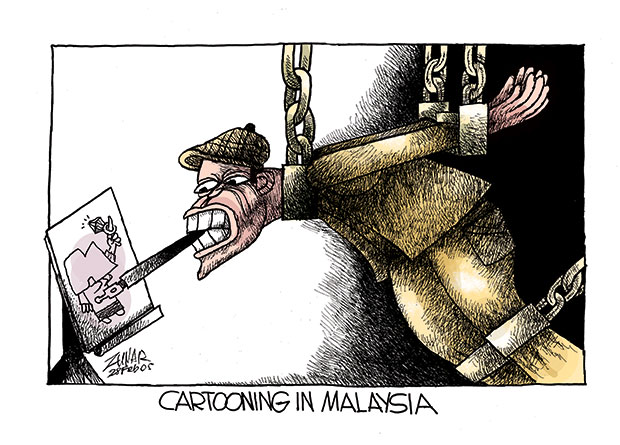
|
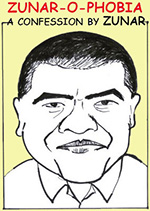
Zulkiflee Anwar Haque (Zunar)Malaysia“Why pinch when you can punch?!” says Zunar, believing the best way to make a political impact is to criticise his country’s powerful leaders as harshly as possible. The Malaysian government has banned much of Zunar’s work and repeatedly subjected him to raids, arrest and detainment. Zunar continues undeterred, despite two arrests in 2015 already. @zunarkartunis | web |
|
|
|
Australia |
|
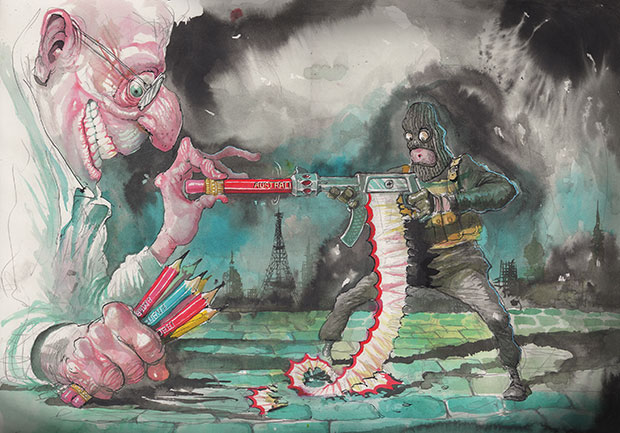
|
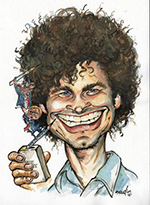
David RoweAustraliaAward-winning cartoonist David Rowe has worked as an editorial artist for the Australian Financial Review for 22 years. Rowe’s bright and colorful watercolors are famously merciless. He is a three-time winner of the Stanley Award for Australia’s Cartoonist of the Year. @roweafr |
|
|
|
Africa |
|
|
|
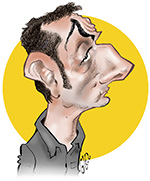
Damien Glez (Glez)Burkina FasoGlez’s cartoons regularly appear in publications spanning three continents, including Le Journal du Jeudi, for which he is the delegated director of publication, and the satirical Le Marabout, which he co-created. He writes his own comic strip called Divine Comedy. @DamienGlez | web |